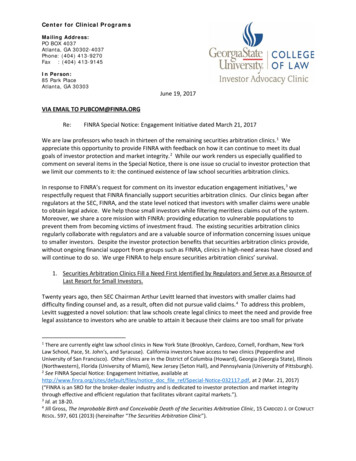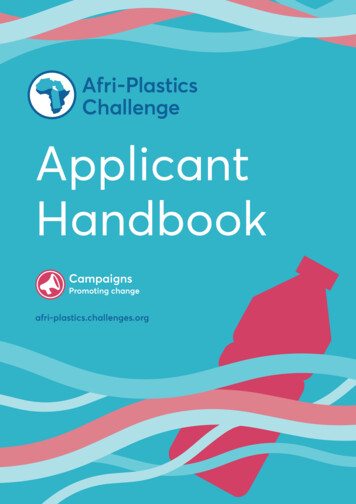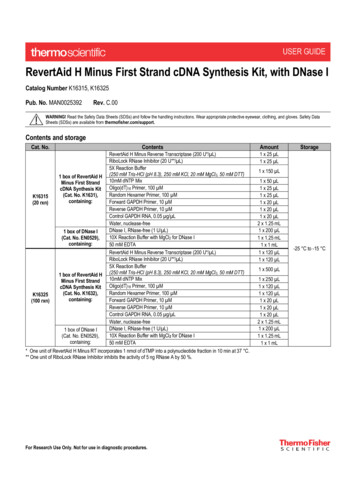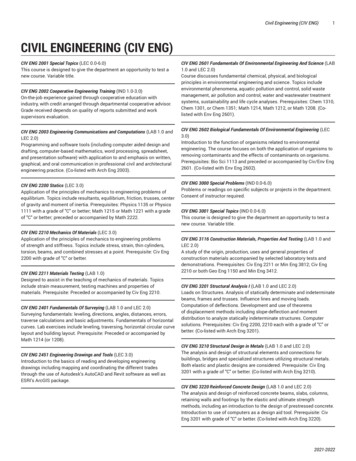
Transcription
Strand v. Charles Mix CountyDoc. 39UNITED STATES DISTRICT COURTfiledDISTRICT OF SOUTH DAKOTA 2017SOUTHERN ***********TRACY STRAND,*CIV 16-4037*Plaintiff,**-vs-**CHARLES'MIX COUNTY,A POLITICAL *SUBDIVISION OF THE STATE OF*SOUTH DAKOTA,*MEMORANDUM OPINION ANDORDER ON MOTIONFOR SUMMARY ***********************Defendant Charles Mix-County("County"), filed a motion for summary judgment in thisdiscrimination action brought by Plaintiff,Tracy Strand("Strand"),pursuant to the Americans withDisabilities Act("ADA"). (Doc. 20.) For the following reasons, the motion will be denied.BACKGROUNDThe facts are taken primarily from Plaintiffs Supplemental Statement of Material Facts inOpposition to Defendant's Motion for Summary Judgment,Doc.27,because,on summaryjudgment,this Court views the facts in the light most favorable to the non-movant.Strand began working for the County as a road grader in its highway department in 2007.He was primarily responsible for grading the road east of Platte with a coverage area ofapproximately 127 miles. Rick Stemberg("Stemberg") has been employed with the County sincethe early 1990s and was Strand's direct supervisor and foreman at all relevant times. From 2009 topresent,Doug Kniffen("Kniffen")was the highway superintendent and Stemberg's supervisor. TheCounty has thirteen employees in its Highway department including Stemberg and Kniffen.Dockets.Justia.com
During the spring,summer and fall, the County's grader operators could have work days upto ten hours long. They were given two fifteen minute breaks during the day and a half-hour breakfor lunch. The County did not have a written policy on bathroom usage or a policy on whetheremployees could drive to the shop to use the bathroom. (The highway department had shops inPlatte, Lake Andes and Wagner.) It was commonly understood that ifthe County employees had togo to the bathroom,they wouldjust go outside wherever they were. County employees brought toiletpaper with them while working in the event they had to go to the bathroom. There were times, butnot often, that Strand had to urinate outside while he was working, but he does not recall everdefecating outside during his work prior to his cancer diagnosis in 2010. Strand observed otheremployees drive to use a bathroom and other employees told him that they did so.According to Stemberg, getting leave "isn't a big deal." There is a calendar hanging on thebreak room wall and employees just write down the days they are going to be gone. It is "commoncourtesy" for the employee to tell him what days they have written down to be gone. Likewise, ifan employee is sick,the employee calls Stemberg; when the employee comes back,he fills out"sickleave" on his time card and gives the time card to the secretary. Employees out on sick leave canalso decide to use vacation time too. An employee should call and let Stemberg know that they willbe out for a couple of days. If they can't get ahold of him, they should call Kniffen or the nextchannel. There is no training for employees about how to get leave approved.In May2010,Strand was diagnosed with advanced stage colon cancer. He was offwork fromMay 2010 until the summer of 2011. During that time he had two surgeries, the second of whichinvolved removal ofa portion ofhis colon. Chemotherapy and radiation followed. After completinghis cancer treatment. Strand retumed to work as a road grader for the County part-time for a whileand then full-time beginning July 1,2011. Prior to his cancer diagnosis. Strand did not have issueswith bowel control or frequent waste elimination. As a result ofhis colon resection surgery. Strandexperienced a change in his bowel movements. In his deposition. Strand describes his post-surgerybowel movements as loose, more frequent and more problematic. It varies from day to day.
Sometimes he has to eliminate waste up to ten times a day. He would bring his own toilet paper towork, and his wife had to bring toilet paper to him at work on a couple occasions when he ran out.When he returned to work after his cancer treatments, Strand told supervisors Stemberg andKniffen that the effect ofthe treatment was more fi-equent or more problematic bowel issues. Strandrecalls talking to Kniffen twice and Stemberg about a halfdozen times about his bowel eliminationneeds between his retum to work in 2011 and his termination in 2014. Kniffen said it was"commonsense"that Strand would have bowel frequency;he thought Strand wouldjust stop work more often.Stemberg told Strand to defecate in a field, in a tree belt or to go behind a tire. Strand said that wasunacceptable and indicated that he wanted to be able to driye to use a toilet to eliminate waste,preferably at one ofthe County's shop buildings. Stemberg told Strand that he could not drive to usean indoor toilet. Strand asked Kniffen about the possibility of having a port-a-potty at the Countygravel pit or at roadside locations where he worked. Strand claims that Kniffen's response was tosay that port-a-potties were not necessary. Kniffen denies that conversation and says he would haveaeeommodated Strand if he had known Strand needed a place to go to the bathroom. Kniffen sayshe even would have allowed Strand to drive to the shop to use an indoor bathroom. Stemberg recallsStrand generally asking about having port-a-potties around the County and in the gravel pit, and hereplied that it was the contractors'responsibility to have port-a-potties, nothis. But Stemberg deniesthat Strand ever asked for any accommodation of his bathroom needs. When asked ifStrand wouldhave asked for accommodations, Stemberg testified:Q.[Ms. Poehop] What would you - what should you have said if[Strand] wouldhave brought up [his need to go to the bathroom more frequently after his cancertreatments?]. What do you imagine your response to that would have been underyour policies?A.[Mr.Stemberg]I assume that-you know,like I said, call. It'sjust common sense.If you got a-anybody sick or got problems,ifyou-if you got to go every 5 minutes,you shouldn't be in a blade. Call me and I'll switch with you, and you can go home.You know,if you got a medical condition, you shouldn't be in a blade.Q. What do you mean,"if you've got a medical condition, you shouldn't be in ablade?"
A. If you got medical condition, you shouldn't be running a 230,000-dollar piece ofequipment on a public road where people can get hurt.(Stemberg Depo at 61-62).In April 2014, Strand was driving a gravel dump truck at the County's gravel pit in Wagnerwhen be needed to use the bathroom. After Strand dumped the gravel from bis truck, be told a coworker that be would briefly be out ofthe line oftrucks, and be drove 5 or 6 miles to the County'sshop bathroom in Wagner.When Strand retumed to the County's Platte shop that evening,Stembergconfronted bim and asked why be bad left the line that day. Strand told bim that be bad to use therestroom in Wagner. Stemberg told Strand that be should relieve himself behind the gravel pile atthe pit. Strand said be can't do that. Strand bad observed other drivers drive to use a bathroom andother drivers have told bim that they do so.Strand testified that every time be left work for a doctor's appointment, Stemberg wouldfollow bim out oftown. Stemberg denies this. On one occasion in May 2014,Stemberg told Strandthat be bad followed bim to see if be went to a chiropractic appointment from work. Stembergaccused Strand of going home instead of to bis chiropractic appointment because Strand bad notdriven to a chiropractic office in Platte. But Strand has seen a chiropractor in Gregory,South Dakotasince 2007. Stemberg admitted that be disagreed with Strand taking sick leaye instead of vacationtime after going to a chiropractor one day.Strand's wife called Stemberg on May 13, 2014, to inform bim that Strand was sick due toa kidney infection. Strand also missed work on May 14 and 15,but did not call in. He did not knowthat be needed to call in those days. A note from Strand's doctor releasing bim from work on May13,14 and 15 was filed in Strand's personnel file by the County auditor on May 16,2014. Stembergadmitted that the leave policy is "very relaxed" and that be does not know if Strand violated anyCounty policy by not calling in on May 15 and 16. Strand bad not been required to call in during bisextended leave for bis cancer treatment so this was new to bim. Stemberg did not say anything to
Strand about this sick leave when Strand returned to work after May 15 until his termination on June12.On June 10,2014, Stemberg expressed disagreement with how Strand was blading the roadand asked him to do it differently. Stemberg talked to Kniffen about reprimanding Strand. Kniffentalked to the County Commissioners. On June 12,2014, Stemberg called Strand into his offiee andgave him two reprimands. The first sheet titled "Tracy Strand 1st Reprimand" states:Was told by Forman [sic] to pick windrow up when Blading on Tues. June 10Thursday June 12th was told Again and Was Snippy about it when I told him to doit Right. Was told By Myself and other froman [sie] on How to Law Graven andeontinuously does it different way.(Doe. 27, Tab 4.) Stemberg first told Strand that he was reprimanding Strand for not bladingproperly.(Strand Depo at 89). Strand replied that he had been blading for the County for seven yearswithout any prior eomplaints. {Id). Stemberg told Strand that he should go home and think aboutwhether he could do the job the way Stemberg wanted it done.(Strand Depo at 90).The seeond sheet, titled "Traey Strand 2nd Reprimand," states: "Called In Sick Tues. May13th gone 14th 15th No Call Either Day."(Doe.27,Tab 5.) When Strand saw that he was also beingreprimanded because he had allegedly failed to call about his sick leave on May 13,14 and 15, Strandadvised Stemberg that his wife had ealled in for him and that Strand had also provided a doetor'snote to be excused from work for those dates. (Stemberg was not aware ofthe doctor's note untilafter he reprimanded Strand.) When Strand said that there had been a eall in and a doctor's note forhis May absences, Stemberg replied,"You're fired." That was the end of the conversation.Kniffen has not terminated or reprimanded any County employees.(Kniffen Depo at 39).Stemberg has not diseiplined any other employees besides Strand.(Stemberg Depo at 36). He is notaware ofanybody else who has ever reeeived a written reprimand. {Id. at 45.) Stemberg eould thinkof only one other County employee who has ever been fired other than Strand. One County
Commissioner testified that an employee who was accused ofsexual harassment was only talked toand told to quit the harassing behavior.In December 2014, Strand filed a Chkrge of Discrimination with the Equal EmploymentOpportunity Commission("EEOC"). On or about December 28,2015, Strand received a Notice ofSuit Rights from the EEOC. This action followed.In his Complaint, Strand alleges that the County violated the ADA by refiising to providereasonable accommodations for Strand's disability, subjecting him to disciplinary actions andterminating his employment because of his disability.The County asserts that it is entitled to summaryjudgment because Strand fails to establishhe has a disability and, even if he has a disability, he fails to show that his employment wasterminated because of his disability.LEGAL STANDARD FOR SUMMARY JUDGMENTRule 56 of the Federal Rules of Civil Procedure provides that summary judgment shall begranted "ifthe movant shows that there is no genuine dispute as to any material fact and the movantis entitled to judgment as a matter oflaw."FED.R.CIV.P. 56(a). In ruling on a motion for summaryjudgment,the Court is required to view the facts in the light mostfavorable to the non-moving partyand must give that party the benefit of all reasonable inferences to be drawn from the underlyingfacts. AgriStor Leasing V. Farrow, S26F.2d 732,734 {Sth Civ. 1987). The moving party bears theburden of showing both the absence of a genuine issue of material fact and its entitlement tojudgment as a matter of law. Fed.R.Civ.P. 56(a); Anderson v. Liberty Lobby, Inc., All U.S. 242,257(1986). Once the moving party has met its burden, the non-moving party may not rest on theallegations ofits pleadings but must set forth specific facts, by affidavit or other evidence,showingthat a genuine issue of material fact exists. Fed.R.Civ.P. 56(c); Anderson, All U.S. at 257; City ofMt. Pleasant v. Associated Elec. Coop., Inc., 838 F.2d 268, H7 -1A (8th Cir. 1988). All factspresented to the district court by the non-moving party are accepted as true ifproperly supported by
the record. See Beck v. Skon, 253 F.3d 330, 332-33 (8th Cir. 2001). Employment discriminationcases are not immune from summary judgment, and there is no separate summary judgmentstandard that applies to these cases. See Fercello v. Cty. ofRamsey,612 F.3d 1069,1077(8th Cir.2010).DISCUSSIONThe ADA provides that"[n]o covered entity shall discriminate against a qualified individualon the basis of disability in regard to job application procedures, the hiring, advancement, ordischarge of employees, employee compensation, job training, and other terms, conditions, andprivileges ofemployment."42U.S.C.§ 12112(a). In employment discrimination eases,theplaintiffbears the initial burden of establishing a prima facie case to survive summaryjudgment. Miners v.Cargill Commc'ns, Inc., 113 F.3d 820, 823(8th Cir. 1997)."To establish a prima facie ease underthe ADA,a plaintiffmust show [(1)] that she was a disabled person within the meaning ofthe ADA,[(2)] that she was qualified to perform the essential functions ofthejob, and [(3)] that she sufferedan adverse employment action under circumstances giving rise to an inference of unlawfuldiscrimination."/J. (citing Price V. 5-5 Power Tool, 75 F.3d 362,365 (8th Cir. 1996)). Oncethe plaintiff demonstrates a prima facie case,"the burden of production shifts to the employer toarticulate a legitimate, nondiscriminatory reason for its actions." Id. (citing McDonnell DouglasCorp. V. Green, 411 U.S. 792, 802 (1973)). Finally, after the employer produces itsnondiscriminatory reasons for its actions,"the burden ofproduction then shifts back to the plaintiffto demonstrate that the employer's proffered reason is a pretext for unlawful discrimination."Id. (citing 5t. Mary's Honor Ctr. v. ifrcAs, 509 U.S. 502, 507-08(1993)). The evidence producedby the plaintiff to demonstrate the prima facie ease "and the 'inferences drawn therefrom may beconsidered by the trier offact on the issue of whether the [employer's] explanation is pretextual.'"Id. (quoting Texas Dep't of Community Affairs v. Burdine, 450 U.S. 248, 255 n.lO (1981)).Moreover, "[t]he proof necessary for discrimination eases is flexible and varies with the specificfacts of each case." Id. (citing Young v. Warner-Jenkinson Co., 152 F.3d 1018, 1022 (8th Cir.1998)).
I. Strand's Prima Facie Case1. Disabled Person within Meaning of ADAThe County first argues that Strand is not disabled within the meaning ofthe ADA becausehis alleged impairment does not substantially limit a major life activity, and therefore Strand failsto establish the first element of his prima facie case.The ADA Amendment Act of 2008 ("ADAAA"), effective January 1, 2009, altered theanalysis ofthis element of a plaintiffs prima facie case. The ADAAA substantially broadened thedefinition of a disability under the law,in explicit response to Sutton v. United Air Lines, 527 U.S.471 (1999), and Toyota Motor Mfg. v. Williams, 534 U.S. 184(2002), in which the ADA's termsdefining disability had been limited, "thus eliminating protection for many individuals whomCongress intended to protect." Rohr v. Salt River Project Agric. Imp. and Power Dist., 555 F.3d850, 861 (9th Cir. 2009)(citing 122 Stat. at 3553). Under the ADAAA "disability" is to be broadlyconstrued and coverage is to apply to the "maximum extent" permitted by the ADA and theADAAA.Rohr, 555 F.3d at 861 (citing 122 Stat. at 3553); see also 42 U.S.C. § 12102(4)(A).The ADA defines "disability" as:(A)a physical or mental impairment that substantially limits one or more major lifeactivities ofsuch individual;(B)a record of such an impairment; or(C)being regarded as having such an impairment.42 U.S.C.A. § 12102(1). Strand relies on the first definition of disability, arguing that he has anactual disability, i.e., a substantial limitation on his ability to control elimination of waste.42 U.S.C.A. § 12102(4) provides the following rules of construction for determining adisability under the ADA:(A)The definition of disability in this chapter shall be construed in favor of broadcoverage ofindividuals under this chapter, to the maximum extent permitted by theterms ofthis chapter.8
(B)The term "substantially limits" shall be interpreted consistently with the findingsand purposes ofthe ADA Amendments Act of2008.(C)An impairment that substantially limits one major life activity need not limitother major life activities in order to be considered a disability.(D) An impairment that is episodic or in remission is a disability if it wouldsubstantially limit a major life activity when active.(E)(i) The determination of whether an impairment substantially limits a major lifeactivity shall be made without regard to the ameliorative effects of mitigatingmeasures such as-(I) medication, medical supplies, equipment, or appliances, low-vision devices(which do not include ordinary eyeglasses or contact lenses), prosthetics includinglimbs and devices, hearing aids and cochlear implants or other implantable hearingdevices, mobility devices, or oxygen therapy equipment and supplies;****42U.S.C.A. § 12102.i. ImnairmentThe EEOC regulations define a "[pjhysical or mental impairment" to mean(1) Any physiological disorder or condition, cosmetic disfigurement, or anatomicalloss affecting one or more body systems, such as neurological, musculoskeletal,special sense organs, respiratory (including speech organs), cardiovascular,reproductive, digestive, genitourinary,immune,circulatory, hemic,lymphatic,skin,and endocrine; or29 C.F.R. § 1630.2(h). To prove impairment. Strand relies on his diagnosis ofcolon cancer and theresulting complications from surgery, chemotherapy and radiation that caused him to have thefrequent and unpredictable need to eliminate waste. Strand's medical history and testimony supportsthat he has a physical impairment, and the County does not contend otherwise.
ii. Major Life ActivityAfter the enactment ofthe ADAAA,major life activities include "the operation of a majorbodily function, including but not limited to, functions ofthe immune system, normal cell growth,digestive, bowel, bladder, neurological, brain, respiratory, circulatory, endocrine, and reproductivefunctions." 42 U.S.C.A. § 12102(2)(B). The County agrees that the operation of Strand's bowelmeets the definition of a major life activity. (Doc. 22 at 8.)hi. Substantial LimitationThe County argues that there is insufficient evidence from which a jury could find thatStrand's bowel problems substantially limit his ability to perform a major life activity as comparedto most people in the general population. The EEOC regulations provide the following rules ofconstruction for determining whether an impairment substantially limits an individual:(i) The term "substantially limits" shall be construed broadly in favor of expansivecoverage,to the maximum extent permitted by the terms ofthe ADA."Substantiallylimits" is not meant to be a demanding standard.(ii) An impairment is a disability within the meaning ofthis section ifit substantiallylimits the ability ofan individual to perform a major life activity as compared to mostpeople in the general population. An impairment need not prevent, or significantlyor severely restrict, the individual from performing a major life activity in order tobe considered substantially limiting. Nonetheless, not every impairment willconstitute a disability within the meaning ofthis section.(iii) The primary object of attention in cases brought under the ADA should bewhether covered entities have complied with their obligations and whetherdiscrimination has occurred, not whether an individual's impairment substantiallylimits a major life activity. Accordingly, the threshold issue of whether animpairment "substantially limits" a major life activity should not demand extensiveanalysis.(iv) The determination of whether an impairment substantially limits a major lifeactivity requires an individualized assessment. However,in making this assessment,the term "substantially limits" shall be interpreted and applied to require a degree offunctional limitation that is lower than the standard for "substantially limits" appliedprior to the ADAAA.10
(v) The comparison of an individual's performance of a major life activity to theperformance ofthe same major life activity by most people in the general populationusually will not require scientific, medical, or statistical analysis. Nothing in thisparagraph is intended,however,to prohibit the presentation ofscientific, medical,orstatistical evidence to make such a comparison where appropriate.(vi) The determination of whether an impairment substantially limits a major lifeactivity shall be made without regard to the ameliorative effects of mitigatingmeasures. However,the ameliorative effects ofordinary eyeglasses or contact lensesshall be considered in determining whether an impairment substantially limits amajor life activity.(vii) An impairment that is episodic or in remission is a disability if it wouldsubstantially limit a major life activity when active.'(viii) An impairment that substantially limits one major life activity need notsubstantially limit other major life activities in order to be considered a substantiallylimiting impairment.****29 C.F.R. § 1630.2(j)(l).In arguing that Strand's bowel problems are not substantially limiting, the County focuseson the fact that Strand continued to work for the County for three years after his cancer treatment,that he could go to the bathroom outside if he needed to,"and his more frequent need to eliminatewaste did not preclude him from working or limit his ability to do so." (Doc. 22 at 9-10.) Strandcounters that he did not ever need to defecate outside in the three years ofemployment prior to hiscancer diagnosis, but now he sometimes voids up to ten times a day. He takes prescriptionmedication to try to normalize his bowel control, but it is not entirely effective. There were timeshe needed his wife to deliver toilet paper to him on the job when he ran out.Viewing all facts in the light most favorable to Strand, there are genuine issues of materialfact as to whether the limitation on the major life activity of the operation of his bowels issubstantial.11
2. Qualified to Perform Essential Functions of JobThere is no dispute that Strand was qualified to perform the essential functions of his jobdriving the road grader for the County, the second element of a prima facie ADA ease.3. Adverse Employment ActionAssuming Strand was disabled and was able to complete the essential functions of hisposition with or without reasonable accommodation, Strand must also meet the third element of aprima facie ADA ease, i.e, an adverse employment action under eireumstanees giving rise to aninference of unlawful discrimination. To satisfy this third and final element of a prima facie ease,-Strand must showa specific link between the alleged discriminatory animus and the challengeddecision,sufficient to support a finding by a reasonable fact finder that an illegitimatecriterion actually motivated the adverse employment action. In the absence ofdirectevidence,the plaintiffmay survive summaryjudgment with evidence thatthe adverseemployment action occurred under circumstances giving rise to an inference ofunlawful discrimination.Simpson v. Des Moines Water Works, 425 F.3d 538, 542-43 (8th Cir. 2005), abrogated on othergrounds by Torgerson v. City ofRochester,643 F.3d 1031 (8th Cir. 2011). Strand admits he doesnot have direct evidence that his alleged disability played a role in his termination, which is commonin employment discrimination cases. Strand argues that the following facts give rise to an inferenceof unlawful discrimination:1. After Strand returned to work in 2011 and prior to this termination in June 2014,he talked to Stemberg and Kniffen about his bowel control needs. When he asked tobe able to drive to a County building Stemberg told him to go behind a tree, go intoa field or behind a tire; Strand replied that suggestion was "unacceptable for what Ihave."2. Kniffen admits that he and Strand talked about Strand's bathroom fi-equency;Kniffen said that he anticipated Strand would have bowel frequency after his cancertreatment. BCniffen acknowledges that this would cause Strand to "stop more often"and said that it was fine. Kniffen's testimony about bathroom accommodations forStrand conflicts with what Stemberg told Strand. In fact, Kniffen testified that if hewere Strand's direct supervisor, permitting Strand to drive back to the shop to use an12
indoor bathroom would have been a reasonable accommodation if he was closeenough to make it back.3. Stemberg did recall that Strand had asked him about whether the County wassupposed to have port-a-potties at the gravel pits where the County was hauling from.Stemberg recalls telling Strand that port-a-potties were a contractor duty, not theCounty's responsibility. Stemberg did not ask anyone at the County about gettingport-a-potties because "that's not my position" even though he was responsible forrequisitioning other items for Highway projects.4. Kniffen testified that Stemberg should have brought accommodation requestsforward to him. According to Kniffen, Kniffen would have asked the CountyCommissioners about making the port-a-potty accommodation for Strand. On theother hand.Strand testified that he asked Kniffen directly about the port-a-potties andKniffen said that that was not "necessary."5. Strand testified that Stemberg discovered in April 2014 that Strand had driven agravel tmck out ofa hauling line in order to drive to an indoor bathroom. Stembergfound out about this and confronted Strand at the end of the day. Strand said thatStemberg was belligerent about it and remarked, again, that Strand could relievehimselfbehind a gravel pile. This confrontation was approximately a month and halfbefore Stemberg terminated Strand.6. The County has a very relaxed leave policy. It was not a hassle for otheremployees when Strand missed work in May of2014 due to illness.7. After denying that Strand talked to him about his bathroom needs, Stembergtestified:Q.[Ms. Pochop] What would you- what should you have said if[Strand] wouldhave brought up [his need to go to the bathroom more frequently after his cancertreatments?]. What do you imagine your response to that would have beenunder your policies?[Mr. Stemberg] I assume that- you know,like I said, call. It's just commonsense. If got a- anybody sick or got problems, if you- if you got to go every 5minutes, you shouldn't be in a blade. Call me and I'll switch with you, and youcan go home. You know,if you got a medical condition, you shouldn't be in ablade.Q. What do you mean,"if you've got a medical condition, you shouldn't be in ablade?"13
A. If you got medical condition, you shouldn't be ranning a 230,000-dollar pieceof equipment on a public road where people can get hurt.(Stemberg Depo. at 61-62).Strand argues that this testimony reveals Stemberg's discriminatory animus aboutStrand's requests for bathroom access and port-a-potties.8. Strand believed that Stemberg was following him when he left work for medicalappointments,and Stemberg admitted that he was noticing Strand's use ofsick leaveversus vacation time after going to the chiropractor. While employees are generallyallowed to take time.off and use either sick leave or vacation time, Stemberg had aproblem with Strand putting down the missed time as sick leave instead of vacationtime when Strand left work for a medical appointment.Reviewing the record in the light most favorable to Strand, the Court finds that sufficientevidence exists from which ajury could,find an inference of discrimination. Thus, Strand has methis initial burden of establishing a prima facie case of disability discrimination under McDonnellDouglas.II. Legitimate, Non-Discriminatory Reason for DischargeAs stated earlier, once a plaintiffhas made out a prima facie case ofdisability discrimination,the burden shifts to the defendant to articulate a legitimate,non-discriminatoryreason for the adverseemployment action. McDonnell Douglas, 411 U.S. at 802.The County asserts that Strand was terminated for his "documented insubordination andrepeated inability to follow directions from his supervisors." (Doc. 22 at 17.) The followingdiscussion is taken directly from the section ofthe County's Briefin Support ofSummary Judgmentwhere the proof of this asserted reason for Strand's firing is set forth. {See Doc. 22 at 16-17.)The County contends that, on more than one occasion, Strand was told by Stemberg that heneeded to grade the road pursuant to Stemberg's direction, and Strand ignored these requests.(Stemberg Depo., pp. 71-73; Kniffen Depo., pp. 21-22; Strand Depo., pp. 85-86). Additionally, in14
May 2014, Strand was off work for three consecutive days on May 13, 14, and 15, due to a kidneyinfection, and Strand only called in sick on May 13.(Strand Depo., pp. 77-78). Strand testified thatno one told him that he did not have to call in ifhe was sick. {Id. at p. 79). Stemberg was not awareof Strand's whereabouts on May 14 or May 15, 2014, and testified that just like with all otheremployees, Stemberg simply wanted to know whether Strand
driven to a chiropractic office in Platte. But Strand has seen a chiropractor in Gregory, South Dakota since 2007. Stemberg admitted that be disagreed with Strand taking sick leaye instead of vacation time after going to a chiropractor one day. Strand's wife called Stemberg on May 13, 2014, to inform bim that Strand was sick due to a kidney .










